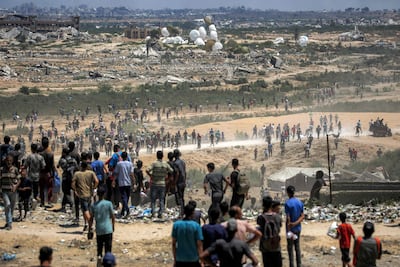Bitter rifts are emerging in Israel over reports that Prime Minister Benjamin Netanyahu is planning a full military occupation of Gaza, a move critics say would endanger hostages held in the strip and push the country's exhausted armed forces to breaking point.
The Prime Minister has been hinting in recent days of an expanded campaign in the Palestinian enclave, with senior officials telling Israeli media major operations are imminent. Mr Netanyahu is using the term “occupation” to describe the plan in conversations with ministers, according to a report on Israeli news website Ynet.
Mr Netanyahu on Tuesday held a "limited security discussion" lasting about three hours, during which the army's chief of staff, Lt Gen Eyal Zamir, presented options for continuing the campaign in Gaza, his office said. The military "is prepared to implement any decision that will be made by the Political-Security Cabinet", the office added in a post on X.
Israeli network Channel 12 said the Prime Minister would hold a Cabinet meeting this week.
Mr Netanyahu's plan involves pushing troops into the estimated 25 per cent of Gaza's territory that the Israeli military has not yet occupied, according to Israeli media reports. These areas include central parts of refugee camps that Israel has so far deemed too dangerous to enter for fear of endangering the lives of hostages that might be held there.
There are no indications from Israel about what such a plan would mean for Gaza's civilians, whose lives are already blighted by rising starvation after months of an Israeli blockade. Eight more people were reported dead from starvation by Gaza health officials on Tuesday, bringing the total to 188 including 94 children.
Speaking on Tuesday at an army training site, Mr Netanyahu said only that the army must "complete" the defeat of Hamas in Gaza to secure the release of hostages, giving little away about the possible expansion of the war. Israel also aims to "ensure that Gaza will no longer pose a threat to Israel," Mr Netanyahu said.
Lt Gen Zamir was reported to be strongly opposed to the reoccupation plan, according to The Times of Israel, given the complexity of dismantling areas in which Hamas is deeply embedded. The toll such an operation would take on exhausted troops after 669 days of war is also thought to be of concern.
Many human rights bodies considered Gaza to fully occupied even before the war, with Israel controlling access by land and sea as well as the territory's airspace. Mr Netanyahu’s plan would, however, extend Israeli control over the strip to a new level, paving the way for a potential total displacement of Gazan civilians and even annexation, a major goal of some members of his far-right government who want Israel to resettle the area.
Efforts in recent weeks to increase aid distribution have been chaotic and a major new military operation would be expected to complicate humanitarian efforts. Jens Laerke, a spokesman for UN humanitarian body OCHA, said he was in no mood to "clap and say thank you" when only a modest amount of aid has been allowed in.
"Aid has gone in with dozens of trucks per day ... the needs inside Gaza are such that there should be hundreds and hundreds," Mr Laerke said. He said that level of aid might need to be sustained for months or even years to restore a proper level of nutrition.
Far-right National Security Minister Itamar Ben-Gvir piled pressure on the army chief over his alleged reluctance. “The Chief of Staff is required to state clearly that he will fully comply with the directives of the political echelon, even if a decision is made for conquest and decisive action,” the minister wrote on X.
Other ministers expressed support for Lt Gen Zamir, with Foreign Minister Gideon Sa’ar writing on X: “The Chief of Staff is required to express his professional opinion clearly and unequivocally to the political echelon. I am convinced that he will do so.”
Opposition leader Yair Lapid called for any differences over the occupation plan to remain behind closed doors, writing on X that “soldiers don’t need to think that a divided and conflicted leadership is leading them, that the political echelon does not respect their commander, that they are selling them out for a headline”.
The latest tension comes against a backdrop of rising anger in Israel over the war, now in its 23rd month. Hundreds of retired Israeli security officials, including former heads of intelligence agencies, urged US President Donald Trump on Monday to pressure Israel's leadership to end the war.
“It is our professional judgment that Hamas no longer poses a strategic threat to Israel,” the former officials wrote in an open letter.
The specs
- Engine: 3.9-litre twin-turbo V8
- Power: 640hp
- Torque: 760nm
- On sale: 2026
- Price: Not announced yet
Why seagrass matters
- Carbon sink: Seagrass sequesters carbon up to 35X faster than tropical rainforests
- Marine nursery: Crucial habitat for juvenile fish, crustations, and invertebrates
- Biodiversity: Support species like sea turtles, dugongs, and seabirds
- Coastal protection: Reduce erosion and improve water quality
GAC GS8 Specs
Engine: 2.0-litre 4cyl turbo
Power: 248hp at 5,200rpm
Torque: 400Nm at 1,750-4,000rpm
Transmission: 8-speed auto
Fuel consumption: 9.1L/100km
On sale: Now
Price: From Dh149,900
The five pillars of Islam
AI traffic lights to ease congestion at seven points to Sheikh Zayed bin Sultan Street
The seven points are:
Shakhbout bin Sultan Street
Dhafeer Street
Hadbat Al Ghubainah Street (outbound)
Salama bint Butti Street
Al Dhafra Street
Rabdan Street
Umm Yifina Street exit (inbound)
UAE currency: the story behind the money in your pockets
Tuesday's fixtures
Kyrgyzstan v Qatar, 5.45pm
More on animal trafficking
UAE tour of Zimbabwe
All matches in Bulawayo
Friday, Sept 26 – UAE won by 36 runs
Sunday, Sept 28 – Second ODI
Tuesday, Sept 30 – Third ODI
Thursday, Oct 2 – Fourth ODI
Sunday, Oct 5 – First T20I
Monday, Oct 6 – Second T20I
BANGLADESH SQUAD
Mashrafe Mortaza (captain), Tamim Iqbal, Liton Das, Soumya Sarkar, Mushfiqur Rahim (wicketkeeper), Mahmudullah, Shakib Al Hasan (vice captain), Mohammad Mithun, Sabbir Rahaman, Mosaddek Hossain, Mohammad Saifuddin, Mehidy Hasan Miraz, Rubel Hossain, Mustafizur Rahman, Abu Jayed (Reporting by Rohith Nair in Bengaluru Editing by Amlan Chakraborty)
Women%E2%80%99s%20T20%20World%20Cup%20Qualifier
%3Cp%3EFrom%20September%2018-25%2C%20Abu%20Dhabi%0D.%20The%20two%20finalists%20advance%20to%20the%20main%20event%20in%20South%20Africa%20in%20February%202023%0D%3Cbr%3E%20%0D%3Cbr%3EGroup%20A%3A%20United%20States%2C%20Ireland%2C%20Scotland%2C%20Bangladesh%0D%3Cbr%3EGroup%20B%3A%20UAE%2C%20Thailand%2C%20Zimbabwe%2C%20Papua%20New%20Guinea%0D%3Cbr%3E%20%0D%3Cbr%3EUAE%20group%20fixtures%3A%0D%3Cbr%3ESept%2018%2C%203pm%2C%20Zayed%20Cricket%20Stadium%20%E2%80%93%20UAE%20v%20Thailand%0D%3Cbr%3ESept%2019%2C%203pm%2C%20Tolerance%20Oval%20-%20PNG%20v%20UAE%0D%3Cbr%3ESept%2021%2C%207pm%2C%20Tolerance%20Oval%20%E2%80%93%20UAE%20v%20Zimbabwe%0D%3Cbr%3E%20%0D%3Cbr%3EUAE%20squad%3A%20Chaya%20Mughal%20(captain)%2C%20Esha%20Oza%2C%20Kavisha%20Kumari%2C%20Rinitha%20Rajith%2C%20Rithika%20Rajith%2C%20Khushi%20Sharma%2C%20Theertha%20Satish%2C%20Lavanya%20Keny%2C%20Priyanjali%20Jain%2C%20Suraksha%20Kotte%2C%20Natasha%20Cherriath%2C%20Indhuja%20Nandakumar%2C%20Vaishnave%20Mahesh%2C%20Siya%20Gokhale%2C%20Samaira%20Dharnidharka%0D%3C%2Fp%3E%0A
RESULTS
5pm: Maiden (PA) Dh80,000 1,600m
Winner: Raghida, Szczepan Mazur (jockey), Ibrahim Al Hadhrami (trainer)
5.30pm: Maiden (PA) Dh80,000 1,600m
Winner: AF Alareeq, Connor Beasley, Ahmed Al Mehairbi
6pm: Arabian Triple Crown Round-2 Group 3 (PA) Dh300,000 2,200m
Winner: Basmah, Fabrice Veron, Eric Lemartinel
6.30pm: Liwa Oasis Group 2 (PA) Dh300,000 1,400m
Winner: AF Alwajel, Tadhg O’Shea, Ernst Oertel
7pm: Wathba Stallions Cup Handicap (PA) Dh70,000 1,600m
Winner: SS Jalmod, Richard Mullen, Satish Seemar
7.30pm: Handicap (TB) Dh100,000 1,600m
Winner: Trolius, Ryan Powell, Simon Crisford
How to watch Ireland v Pakistan in UAE
When: The one-off Test starts on Friday, May 11
What time: Each day’s play is scheduled to start at 2pm UAE time.
TV: The match will be broadcast on OSN Sports Cricket HD. Subscribers to the channel can also stream the action live on OSN Play.
BMW M5 specs
Engine: 4.4-litre twin-turbo V-8 petrol enging with additional electric motor
Power: 727hp
Torque: 1,000Nm
Transmission: 8-speed auto
Fuel consumption: 10.6L/100km
On sale: Now
Price: From Dh650,000
Specs
Engine: Duel electric motors
Power: 659hp
Torque: 1075Nm
On sale: Available for pre-order now
Price: On request
The specs
Engine: 6.2-litre supercharged V8
Power: 712hp at 6,100rpm
Torque: 881Nm at 4,800rpm
Transmission: 8-speed auto
Fuel consumption: 19.6 l/100km
Price: Dh380,000
On sale: now
SOUTH%20KOREA%20SQUAD
%3Cp%3E%0D%3Cstrong%3EGoalkeepers%3A%20%3C%2Fstrong%3EKim%20Seung-gyu%2C%20Jo%20Hyeon-woo%2C%20Song%20Bum-keun%0D%3Cbr%3E%3Cstrong%3EDefenders%3A%20%3C%2Fstrong%3EKim%20Young-gwon%2C%20Kim%20Min-jae%2C%20Jung%20Seung-hyun%2C%20Kim%20Ju-sung%2C%20Kim%20Ji-soo%2C%20Seol%20Young-woo%2C%20Kim%20Tae-hwan%2C%20Lee%20Ki-je%2C%20Kim%20Jin-su%0D%3Cbr%3E%3Cstrong%3EMidfielders%3A%20%3C%2Fstrong%3EPark%20Yong-woo%2C%20Hwang%20In-beom%2C%20Hong%20Hyun-seok%2C%20Lee%20Soon-min%2C%20Lee%20Jae-sung%2C%20Lee%20Kang-in%2C%20Son%20Heung-min%20(captain)%2C%20Jeong%20Woo-yeong%2C%20Moon%20Seon-min%2C%20Park%20Jin-seob%2C%20Yang%20Hyun-jun%0D%3Cbr%3E%3Cstrong%3EStrikers%3A%20%3C%2Fstrong%3EHwang%20Hee-chan%2C%20Cho%20Gue-sung%2C%20Oh%20Hyeon-gyu%3C%2Fp%3E%0A
The specs
Engine: 2.7-litre 4-cylinder Turbomax
Power: 310hp
Torque: 583Nm
Transmission: 8-speed automatic
Price: From Dh192,500
On sale: Now
The biog
Favourite food: Fish and seafood
Favourite hobby: Socialising with friends
Favourite quote: You only get out what you put in!
Favourite country to visit: Italy
Favourite film: Lock Stock and Two Smoking Barrels.
Family: We all have one!
Company%20profile
%3Cp%3E%3Cstrong%3ECompany%20name%3A%3C%2Fstrong%3E%20Fasset%0D%3Cbr%3E%3Cstrong%3EStarted%3A%20%3C%2Fstrong%3E2019%0D%3Cbr%3E%3Cstrong%3EFounders%3A%3C%2Fstrong%3E%20Mohammad%20Raafi%20Hossain%2C%20Daniel%20Ahmed%0D%3Cbr%3E%3Cstrong%3EBased%3A%3C%2Fstrong%3E%20Dubai%0D%3Cbr%3E%3Cstrong%3ESector%3A%20%3C%2Fstrong%3EFinTech%0D%3Cbr%3E%3Cstrong%3EInitial%20investment%3A%3C%2Fstrong%3E%20%242.45%20million%0D%3Cbr%3E%3Cstrong%3ECurrent%20number%20of%20staff%3A%3C%2Fstrong%3E%2086%0D%3Cbr%3E%3Cstrong%3EInvestment%20stage%3A%3C%2Fstrong%3E%20Pre-series%20B%0D%3Cbr%3E%3Cstrong%3EInvestors%3A%3C%2Fstrong%3E%20Investcorp%2C%20Liberty%20City%20Ventures%2C%20Fatima%20Gobi%20Ventures%2C%20Primal%20Capital%2C%20Wealthwell%20Ventures%2C%20FHS%20Capital%2C%20VN2%20Capital%2C%20local%20family%20offices%3C%2Fp%3E%0A
It's up to you to go green
Nils El Accad, chief executive and owner of Organic Foods and Café, says going green is about “lifestyle and attitude” rather than a “money change”; people need to plan ahead to fill water bottles in advance and take their own bags to the supermarket, he says.
“People always want someone else to do the work; it doesn’t work like that,” he adds. “The first step: you have to consciously make that decision and change.”
When he gets a takeaway, says Mr El Accad, he takes his own glass jars instead of accepting disposable aluminium containers, paper napkins and plastic tubs, cutlery and bags from restaurants.
He also plants his own crops and herbs at home and at the Sheikh Zayed store, from basil and rosemary to beans, squashes and papayas. “If you’re going to water anything, better it be tomatoes and cucumbers, something edible, than grass,” he says.
“All this throwaway plastic - cups, bottles, forks - has to go first,” says Mr El Accad, who has banned all disposable straws, whether plastic or even paper, from the café chain.
One of the latest changes he has implemented at his stores is to offer refills of liquid laundry detergent, to save plastic. The two brands Organic Foods stocks, Organic Larder and Sonnett, are both “triple-certified - you could eat the product”.
The Organic Larder detergent will soon be delivered in 200-litre metal oil drums before being decanted into 20-litre containers in-store.
Customers can refill their bottles at least 30 times before they start to degrade, he says. Organic Larder costs Dh35.75 for one litre and Dh62 for 2.75 litres and refills will cost 15 to 20 per cent less, Mr El Accad says.
But while there are savings to be had, going green tends to come with upfront costs and extra work and planning. Are we ready to refill bottles rather than throw them away? “You have to change,” says Mr El Accad. “I can only make it available.”
Draw:
Group A: Egypt, DR Congo, Uganda, Zimbabwe
Group B: Nigeria, Guinea, Madagascar, Burundi
Group C: Senegal, Algeria, Kenya, Tanzania
Group D: Morocco, Ivory Coast, South Africa, Namibia
Group E: Tunisia, Mali, Mauritania, Angola
Group F: Cameroon, Ghana, Benin, Guinea-Bissau



